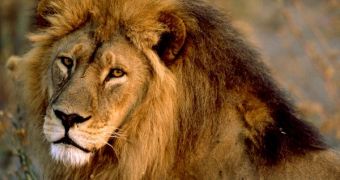Back in 2012, wildlife researchers said that West Africa was home to about 500 lions. This number is worryingly low to begin with so, naturally, conservationists will not be glad to hear that, according to a new report in the scientific journal PLOS ONE, West Africa's lion population is even smaller than 500 individuals.
Not to beat about the bush, said report says that, presently, merely 250 adult felines belonging to this species inhabit West Africa. Otherwise put, lions are dangerously close to extinction in this part of the world.
In their report, the scientists who carried out this latest census of West Africa's lion population detail that, as far as they could tell, the big cats currently occupy a territory that is about 1% of the species' historic range.
In light of these findings, the researchers warn that, unless conservation measures are implemented without delay, three of the four West African lion populations will fall off the biodiversity map in about five years' time.
According to Mongabay, West Africa's remaining lions inhabit just four parks in the region. Of these parks, just one is home to over 50 felines.
The big cats' range is limited to small areas in Senegal, Nigeria and the borderlands between Benin, Niger and Burkina Faso, the same source tells us.
“Individuals are limited in their choice of mates, and end up reproducing with closely related individuals,” commented on these findings study co-author Philipp Henschel, as cited by LiveScience.
“Such inbreeding reduces the genetic fitness of sired offspring, which, in lions, manifests itself in lower reproductive success,” the researcher went on to explain.
As detailed in the paper published in the journal PLOS ONE this January 8, West Africa's lions are threatened with extinction due to the fact that local human community has greatly expanded.
An increase in the number of local livestock herds, habitat loss, poaching, and a drop in prey population are also to blame. What's more, it appears that the parks that these felines inhabit are underfunded.
Specialist Philipp Henschel and his colleagues recommend that the International Union for Conservation of Nature list West Africa's lions as critically endangered, and urge that conservation campaigns be rolled out as soon as possible.
The researchers say that protecting these felines is all the more important given the fact that, according to recent evidence, these felines are genetically distinct from lions in other regions of the continent, and might therefore represent a distinct subspecies.
“West African lions have unique genetic sequences not found in any other lions, including in zoos or captivity. If we lose the lion in West Africa, we will lose a unique, locally adapted population found no-where else,” explains Christine Breitenmoser, the co-chair of the IUCN/SCC Cat Specialist Group.

 14 DAY TRIAL //
14 DAY TRIAL //